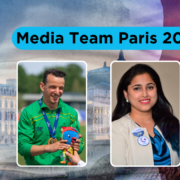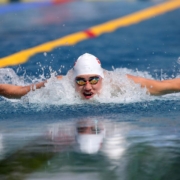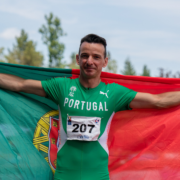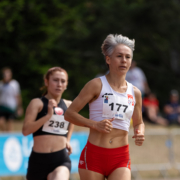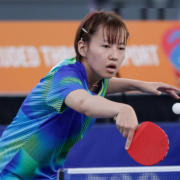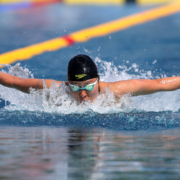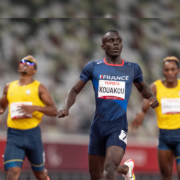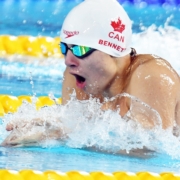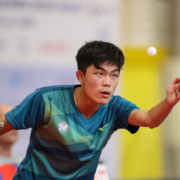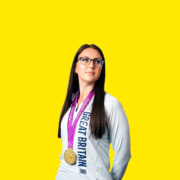Alexander Hillhouse’s Journey From His Backyard Pool To Paris 2024
As the Paris 2024 Paralympic Games draw near, Denmark eagerly anticipates the debut of one of its brightest stars, Paralympic swimmer Alexander Hillhouse.
From the calming waters of his backyard pool to the world stage, Alexander’s journey is as inspiring as it is remarkable.
“My biggest supporter is my mom, dad, coaches, and teammates. They mean the world to me, and I’m grateful to have them by my side wherever I go,” Alexander shares, reflecting on the unwavering encouragement that has fuelled his athletic journey.
Unlike many other athletes who fell in love with their sport in school or through therapy, Alexander fell in love with the sport in his backyard pool and how killer whales used to swim.
“I had a back pool in the backyard. When I was little and I just fell in love with it (swimming). I thought that it would be pretty cool, just probably to swim in it and I found it interesting and like killer whales and how they swim. And I think I just wanted to be like them because I just love the pool and I like the whales and how they swim and I think it got me motivated to train all the time.”
Inspired by swimming legend Michael Phelps, Alexander’s passion for the sport ignited after witnessing Phelps’ historic achievements at the Beijing Olympics.
“Phelps is my role model, his success motivated me to pursue swimming with all my heart,“ Alexander enthuses.
Navigating the challenges of early morning training sessions and the invisible nature of his intellectual impairment, Alexander remains stubborn in his hunt of excellence.
“It’s just something that I have and I’m alright with that or that I figure out that I could be this person, you know. In other words, like, sure, we’ll give it a shot and see how it goes. And I gotta say, having intellectual impairment has changed my life actually. Going around the world, representing my country, winning competitions.”
“Everyone thinks that I just look like a normal person, but when they see me then they know that I’m a little bit autistic. You can see the impairment in people who have physical or visual impairment, but everyone just doesn’t think that about me. It’s good in a way. Everyone just thinks that I’m just a normal kid and I’m just swimming really fast.
“Waking up early is tough, but it’s part of the journey, but I’m committed to pushing my limits and achieving my goals.” he admits.
With a rigorous training regimen comprising 10 sessions per week, Alexander’s dedication is unwavering.
“I train every morning from Monday to Friday, with additional sessions on Saturdays,” he explains. “It’s demanding, but I love every moment in the pool.“
Alexander received his Virtus eligibility in early 2020 which opened his international para-swimming career. Alexander won two gold, three silver and two bronze at the 2023 Virtus Global Games and aspires to repeat his results at the next Global Games too.
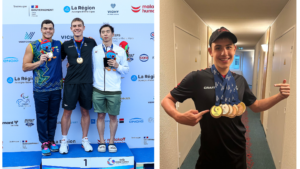
Gabriel Bandeira (BRA), Alexander Hillhouse (DEN) and Cho Wonsang (KOR) at the victory ceremony for II1 50m Butterfly at GG2023 (L) and Alexander flaunting all his Global Games medal (R). Photo Credit: T.Nguyen and Alexander Hillhouse.
“Vichy 2023 was my first Virtus Global Games, I did some great racing over there. It was pretty amazing. All the friendships I made there were like pretty real. My hard work paid off as I came back with some amazing results. I hope I can do the same at the upcoming Global Games in Cairo 2027.”
Alexander won two gold, three silver and two bronze along with four Danish records at the 2023 Virtus Global games last year.
Reflecting on his journey, Alexander also highlighted his silver medal win at the 2023 World Para Swimming Championships in Manchester as a defining moment.
“Qualifying for Paris 2024 was a dream come true, it’s a testament to the hard work and dedication of everyone who supported me.”
Looking ahead, Alexander’s sights are set on breaking the world record in the 100m butterfly, a feat that epitomizes his pursuit of excellence.
“I’m determined to push the boundaries of what’s possible, it’s a challenge I’m ready to embrace,” he asserts.
As Alexander prepares to represent Denmark at the Paris 2024 Paralympic Games, his focus extends beyond medals to embracing the experience of competing on the global stage.
“I’ve been wanting a medal since like Michael Phelps won a gold medal and just any medal and I am also looking forward to the whole Paralympic games experience too. I think the experience could be amazing because it’s Paris 2024, it only happens once in four years, It’s a privilege to compete alongside friends from around the world,“ Alexander shares.
To aspiring athletes with intellectual impairments, Alexander’s message is one of resilience and determination.
“Never give up, with dedication and perseverance, anything is possible ”
As Denmark rallies behind Alexander Hillhouse, the nation celebrates his journey from backyard pools to international podiums. With each stroke, Alexander embodies the spirit of determination and the power of dreams, proving that with unwavering commitment, the sky’s the limit.
Join Virtus’ #MakingInvisibleVISIBLE campaign in making Alexander’s journey Visible.
What is Intellectual Impairment?
Intellectual impairment is an umbrella term to describe a vast and neuro-diverse group of people with varying types of cognitive impairments including intellectual disability, Down syndrome and autism. Having an intellectual impairment impacts how an athlete understands the rules of the sport, interacts with other players, and adjusts to different environments. They might find it difficult to manage reaction times, remember specific race or game strategies, retain focus for long period of time, or maintaining impulse control.
Virtus Ambassador Lenine Cunha Shortlisted As Nominated Candidate For The IPC Athletes‘ Council Elections
A record 26 candidates have been nominated for election during the Paris 2024 Paralympic Games to fill six summer representative roles on the International Paralympic Committee (IPC) Athletes’ Council. The IPC Athletes’ Council, composed of elected athlete representatives, serves as the voice of the Para athlete community to the IPC. This year, the 26 candidates, including 14 men and 12 women, represent 12 sports and four continents, with 22 being actively competing athletes.
For the first time in history, an athlete with an intellectual impairment has been nominated by Virtus Sport and shortlisted by IPC for the IPC Athletes’ Council election. Lenine Cunha is a Virtus Ambassador. His international career started in 2000 and since then he has won more than 220 international medals including a bronze at the London 2012 Paralympic Games and multiple gold medals from Virtus Global Games.
He is one of the rare athletes who has competed across all six editions of Virtus Global Games and at three Summer Paralympic Games, Sydney 2000, London 2012 and Rio 2016.
Talking about his intentions behind standing for the election and his aspirations if he gets selected in the IPC’s Athletes’ Council, Lenine said,
“The IPC’s Athletes’ Council holds a prestigious position as the voice of athletes with various impairments. However, there is currently no one representing athletes with intellectual impairment within the IPC’s Athletes’ Council — a significant gap that I hope to fill. With approximately 2-3% of the global population living with intellectual impairment, it is important that we have representation in the IPC’s Athletes’ Council.”
“I want to talk about the rights and interests of athletes with intellectual impairment, and ensuring our voices are heard, and valued within the international sporting community. I also want to show my leadership that I have learned because of sport, and to use my experiences to add ideas to IPC that is more inclusive of all disability groups, for a better future for next Paralympians.”
“As someone who has spent his entire life with this invisible impairment and made a career out of it, I understand the challenges and discrimination faced by athletes like me and I want to continue advocating for their needs on a global scale using the IPC’s Athletes’ Council platform. I also recognise the importance of ensuring that the concerns and aspirations of all athletes, including athletes with an intellectual impairment are heard and addressed within the Paralympic movement.”
“While the IPC has made significant efforts in raising awareness of various disabilities, there is still work to be done in making intellectual impairment more visible and promoting inclusive pathways for athletes like me. I am excited to have the opportunity to work with the IPC to achieve these goals, and to hopefully see more participation from current and new nations in the Paralympic movement.”
“Another topic I want to talk about is the difficulty that athletes and especially athletes with an intellectual impairment can often face during their transition from athletic careers to post-retirement life. I am experiencing this myself, and by joining the IPC, I want to develop resources and support systems that will help retiring athletes of all disability to manage this transition successfully.”
Lenine Cunha has been an extremely proactive Virtus Ambassador. He recently was selected by Virtus to become the flag bearer of the #MakingInvisibleVISIBLE campaign launched by Virtus during the GG2023 anniversary week.
The Athletes’ Council acts as a liaison between athletes and decision-makers, significantly influencing the growth and development of Paralympic sports. The IPC Electoral Commission will oversee the election, ensuring adherence to the IPC Code of Ethics and Campaign Rules. The six newly elected members will be announced at the Closing Ceremony on 8 September. They will join the three winter representatives elected during the Beijing 2022 Paralympic Winter Games, and appointed member Greg Polychronidis of Greece, and the IOC Athletes’ Commission Chair to complete the IPC Athletes’ Council.
The election will be held from 26 August to 5 September in PLY House, near the Main Dining Hall in the Paralympic Village, and in the Athlete Lounge at Chateauroux Village for Shooting Para sports athletes. Virtus urges all athletes competing at Paris 2024, especially athletes with intellectual impairment, to vote. If elected, Lenine Cunha will be the first athlete with an intellectual impairment to join the IPC Athletes’ Council, a historic moment for Lenine, for Virtus and for inclusion of millions of past, current and future athletes with an intellectual impairment around the world.
For more information, visit Paralympic.org/athletes-council. Read IPC’s announcement here.
Forty-Two-Year-Old Barbara Bieganowska-Zając Running To Win Her Fifth Paralympic Gold At Paris 2024
In the beautiful city of Frączków, Poland, resides a legend who won four Paralympic medals and multiple Virtus Global Games and WPA World Championship titles, Barbara Bieganowska-Zając. Also known as the ‘Golden Basia’, Barbara is preparing to win her fifth Paralympic gold medal at Paris 2024.
Barbara’s journey in sports began in her childhood. She was very active, everything interested her when she was a child. She got into initially through play, I started my adventure with athletics.”
Barbara Bieganowska-Zając is married to her supportive husband Piotr and is the proud mother of two beautiful young daughters, Wiktoria and Martyna. Her daughters are well aware of her accomplishments and take pride in having a world and Paralympic champion as their mother. Balancing her roles as an athlete and a mother, Barbara excels in both, thanks to the unwavering support from her husband and family. They create a peaceful and quiet environment for her to train, which she deeply values.
“My role as a mum I think I do very well—maybe not perfectly, but certainly very well. I share the roles perfectly as a mum, parent, and friend for my daughters. We get along well, support each other, and everything is okay.”
“My family is also very active in sports. They support me spiritually and athletically and are always with me when I have difficult days.”
Having lived a life with intellectual impairment, Barbara is keenly aware of the challenges faced by those with intellectual disabilities.
“My disability hinders me a lot in such activities. I have problems filling in forms or any kind of paperwork, and I even find it very difficult to work with the ADAMS system, which I have to run on a daily basis and fill in various fields. I am very happy to have a husband who is by my side and helps me with all this. I am very grateful to him for that.”
“In the beginning, everything in training was difficult for me because I was learning everything. And I am still learning. There are some workouts which are difficult for me, ones where I have to calculate times in continuous runs or speed stretches, where I need my coach’s help with that.”
“People like me are invisible at first sight, and people just don’t believe us. We face many problems daily. It is more difficult for us to get a sponsor like people with physical disabilities. For a lot of people, it’s hard to understand that a person like me, who has two arms and two legs and can see, has a disability and can’t cope in life. It’s not all quite as many people think.”
Barbara also mentioned facing trolls on social media due to her impairment. Despite the negative comments she received on social media early in her career, Barbara remains resilient.
“In the beginning, I had all sorts of comments on Instagram, Facebook, and other social media about my personality. But I’m the kind of person who doesn’t take negative things from other people to heart. These are the kind of people who don’t understand people with intellectual impairment. The problem I have always had, and I do my best to keep it as low-profile and rare as possible”
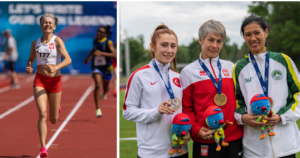
Barbara running 1500m at GG2023 (L) and on the podium with her fellow competitors (R). Photo Credit: Kellerman lens
Barbara’s passion for athletics is evident in her training routine.
“I work out from Monday to Saturday. I do them every day, systematically, and I break it up during the week so that I have the strength and time to do everything, but training always comes first.”
Reflecting on her career, Barbara mentioned how Virtus events like the Virtus Global Games, Virtus European Championships, and Virtus World Championships have played a significant role in her career.
“They certainly opened the way for me to the most important competition, the Paralympic Games, where I am competing.”
Barbara has won four gold and one bronze at previous Paralympic Games, seven gold, two silver and one bronze at the World Championship, six gold from Virtus Global Games and multiple medals from regional championships. When asked about her favourite medal amongst all those which she collected from various international event, she remembered the silver medal she won at an event in New Zealand.
“Probably my most memorable run was at a competition in New Zealand. During the 1500-meter run, right after the start, one of the athletes stepped on my heel and pulled off my shoe. At that moment, I was very scared. I stopped, put my shoe back on, almost sprinted to the running group, and kept running with the group, but unfortunately, I paid for it at the end and lost the gold medal, winning silver instead. That silver medal from the world championships in New Zealand stayed in my mind so much.“
Looking up to her fellow athlete Rafal Rak, who is preparing for the Olympic Games in Paris, Barbara finds inspiration.
“He is my role model today because, like me, he is running 1500 meters.”
As she prepares for the Paris 2024 Paralympic Games, she recognizes all athletes as her competitors.
“My goal is known: to go to the Paralympic Games. I have my goals, I have my dreams, and I am pursuing them. And my goal is to get the best possible place in Paris 2024.”
“We (all the athletes) are all strong and will be well prepared. We will all fight for the best place, and time will tell who will win.”
“My ultimate goal in life is to run, run, and run. I think I’m going to run as much as I have strength and health, and I’m definitely not going to stop at this Paralympic Games, which will be in Paris.”
She shares a message for young athletes with intellectual disabilities: “I would like to tell you, dear ones, not to give up. Fight, have your goals, and pursue them as I did.”
Barbara is grateful for campaigns that highlight the truth about people with intellectual disabilities.
“I am very happy with Virtus launching this campaign that shows the truth about people with intellectual impairment and shows how things really are and not how people sometimes think.”
Join Virtus’ #MakingInvisibleVISIBLE campaign in making Barbara’s journey Visible.
WHAT IS INTELLECTUAL IMPAIRMENT?
Intellectual impairment is an umbrella term to describe a vast and neuro-diverse group of people with varying types of cognitive impairments including intellectual disability, Down syndrome and autism. Having an intellectual impairment impacts how an athlete understands the rules of the sport, interacts with other players, and adjusts to different environments. They might find it difficult to manage reaction times, remember specific race or game strategies, retain focus for long period of time, or maintaining impulse control.
Wada Natsuki Preparing For A Terrific Paralympic Games Debut At Paris 2024
Wada Natsuki, hailing from the vibrant city of Osaka, Japan, is not just a name but an inspiration for many. Living with her mother and elder brother, Natsuki’s journey into the world of table tennis is both heart-warming and empowering. Her mother stands as her pillar of support, cheering her on, comforting her during low moments, and celebrating her victories.
“She always cheers me on, in the house, during practice. When I’m feeling down, she comforts me, and when I win a game, she celebrates with me,” shares Natsuki.
Despite her current success, Natsuki’s journey has not been without its challenges. Her intellectual impairment made her a target for mockery and discrimination. She recalls her difficult school years,
“The teacher was very strict and I was scared. I was bullied and couldn’t go to school. When people found out I have intellectual impairment, they made fun of me, imitated my behaviour, and called me weird,” Natsuki told Virtus.
Natsuki has come up with her own way of dealing with the difficulties she faces due to intellectual impairment.
“I like to keep everything in order so that I know when I am doing what, but if anything in that order changes then I get upset and mad and I cannot do the things I was supposed to do.”
Natsuki began playing table tennis only four years ago, initially as a part of her weight loss journey.
“I started sports when I started dieting to lose weight and then I started practising sports. I started with swimming first and then there was a table tennis place nearby so I started to play table tennis.”
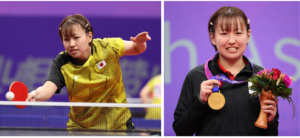
Wada Natsuki at Hangzhou 2022. Photo credit: Takamitsu Mifune
Different athletes with intellectual impairment face different hurdles. For Watsuki, the impairment made it difficult to deal with ‘unpredictability‘. She came up with her way of dealing with things such as keeping things very organised to reduce the element of surprise. However, table tennis presented a unique challenge for Natsuki as it is always unpredictable.
“I am getting used to the unpredictability during the match. However, when the court changes or the timetable changes before a match, there are times when I get upset, I get nervous and sometimes I cannot perform the way I was planning to and can’t keep calm.”
Despite these challenges, Natsuki’s determination never wavered.
Natsuki received her international eligibility with Virtus in September 2022 which opened doors for her at the international para-sports competitions. Natsuki teamed up with Yamamoto Shunta and won gold at the 2022 Virtus Oceania Asia Games and later won gold in Class 11 singles at the Hangzhou 2022 Asian Para Games.
Ranking fourth in the current ITTF world ranking, Natsuki rose quickly to fame which took her by surprise. Qualifying for the Paris 2024 Paralympics was a dream come true for Natsuki.
“I expected to play for Japan but I never expected to go to the Paralympics and to win at the World Championship. At first, I could not feel or understand that I am actually going to Paris 2024, but as time is passing by, I am getting very excited to go to the Paris Paralympics. I am very weak physically so I am doing a lot of muscle training,” she stated.
As she gears up for this prestigious event, her training regimen is intense, involving 2-3 hours of practice daily for 5-6 days a week.
Natsuki remains humble about her achievements, never keeping count of her international medals. Each medal holds a special place in her heart. Her ultimate goal is clear and ambitious:
“First of all, I want to win a gold medal at the Paris Paralympic Games, then I want to be No.1 in the world. And maybe after that, I want to set a winning streak record.”
For young athletes with intellectual impairments, Natsuki offers a message of resilience and hope.
“I think everyone can grow by simply changing the way you do things and the way you think. So don’t give up on anything.”
Natsuki’s story is a testament to the power of perseverance and the unwavering support of loved ones. As she prepares for Paris 2024, her journey continues to inspire many, proving that with determination and support, no dream is too big.
Join Virtus’ #MakingInvisibleVISIBLE campaign in making Wada Natsuki’s journey Visible.
WHAT IS INTELLECTUAL IMPAIRMENT?
Intellectual impairment is an umbrella term to describe a vast and neuro-diverse group of people with varying types of cognitive impairments including intellectual disability, Down syndrome and autism. Having an intellectual impairment impacts how an athlete understands the rules of the sport, interacts with other players, and adjusts to different environments. They might find it difficult to manage reaction times, remember specific race or game strategies, retain focus for long period of time, or maintaining impulse control.
Yui Lam Chan Aspiring To Set New World Record In S14 100m Butterfly At Paris 2024
Yui-lam Chan, a talented young swimmer from Hong Kong, is all set to mesmerise everyone with her terrific swim at the upcoming Paris 2024 Paralympic Games. Despite facing various challenges due to intellectual impairment and other health issues, she has risen to represent her region- Hong Kong, China on the international stage.
Chan enjoys the support of a loving family including her father, mother, older sister, brother, and a pet. Her biggest supporter is her mother, who has been by her side since she started swimming as a child.
“Even now that I represent our region in international competitions, she (her mother) will come over to the venue and cheer for me.”
Chan’s role model is Siobhan Bernadette Haughey, a fellow swimmer known for her excellence and composure in competitions.
“She achieved excellent results in lots of competitions not only because she has a body that is born for swimming, but she also has a very stable mental and physical status in every competition,” Chan admires.
Yui Lam was born prematurely, leading to various health issues, including a respiratory disease and began learning to swim at the age of 10, which soon grew into a passion.
“When I talk or do my work, the respiratory disease would make me cough like escaping from suffocation,” she explains. Swimming has significantly improved her condition by strengthening her cardiopulmonary functions.
“It was not until I started swimming that I discovered the feeling in the water and the fun in it. Now, I am even good enough to represent our region to take part in competitions.”
“Why I like swimming the most is not about results nor achievements I got but the people I met through my swimming journey like my teammates and coaches. Now that I can represent Hong Kong, China to compete worldwide, I also got the chance to meet top swimmers around the world.”
Her rigorous training schedule involves six days a week, with around three hours of training each day. Persistence, she notes, is the most challenging aspect of training.
“We are now representing our region to compete for remarkable results. Only by persisting and doing everything well during training can we achieve this goal.”
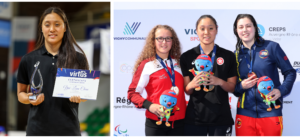
Yui Lam Chan posing with ‘Best female award 2023’ on the left and with her fellow swimmers at the GG2023 podium on right. Photo Credit: T.Nguyen and Grégory Picout
Chan joined the swimming team through selection by the Hong Kong, China Sports Association for Persons with Intellectual Disability (HKSAPID) after a few years of learning swimming. Within a short span of 4 years, she was promoted to the elite team.
Yui Lam received her international eligibility with Virtus in January 2018 which opened doors for her at the international para-sports competitions. Her first international competition was the 2018 World Para Swimming World Series in Copenhagen, where she won multiple medals. She also broke an Asian record in the same year at the Indonesia 2018 Asian Para Games. In 2019, she achieved another breakthrough, participating in her first World Para Swimming Championships and broke her own Asian record again in 100m butterfly and won a bronze medal. This was also the first-ever World Para Swimming Championships medal in the history of the Hong Kong team.
Less than a month later, she competed in the Brisbane 2019 INAS Global Games and won an impressive tally of 2 golds, 3 silvers and 1 bronze in individual events. Her outstanding achievements also earned her the Certificate of Commendation in the Secretary of Home Affairs’ Commendation Scheme and the Cathay Pacific 2019 Hong Kong Junior Sports Stars Awards.
Earning around 58 medals, including six gold, four silver and one bronze from the 2023 Virtus Global Games, Yui Lam was awarded ‘Best Female Athlete of the Year – 2023‘ for her exceptional performance in the past few years.
Her favourite medal is from the Manchester 2023 Para Swimming World Championships, where she won the gold in the 100M Butterfly.
“The gold medal I won got me qualified for the Paralympics, which means a lot to me. I am so happy for that.”
As she prepares for her second Paralympic Games, Yui Lam’s goal is to set foot on the podium and set a new world record in her major event, the 100M Butterfly.
Both (HKSAPID) and Virtus have played crucial roles in Chan’s journey.
“HKSAPID offers us comprehensive training resources, while Virtus organizes competitions that drive athletes to reach our goals”, Chan acknowledges.
Yui Lam’s message to young athletes with intellectual impairments is one of perseverance and dedication.
“I was a beginner like every one of you when I first got in touch with swimming. There is no shortcut to excel in anything except practice. When you find something you are interested in, keep doing it! If you keep practising what you like, your persistence will finally pay off when you reach your goal.”
Yui Lam’s journey is a testament to the power of perseverance, support, and passion. As she prepares for the Paris Paralympic Games, she continues to inspire others with her dedication and achievements, proving that with hard work and support, anything is possible
Join Virtus’ #MakingInvisibleVISIBLE campaign in making Yui Lam’s journey Visible.
WHAT IS INTELLECTUAL IMPAIRMENT?
Intellectual impairment is an umbrella term to describe a vast and neuro-diverse group of people with varying types of cognitive impairments including intellectual disability, Down syndrome and autism. Having an intellectual impairment impacts how an athlete understands the rules of the sport, interacts with other players, and adjusts to different environments. They might find it difficult to manage reaction times, remember specific race or game strategies, retain focus for long period of time, or maintaining impulse control.
Charles Antoine Plans To Channel Home Crowd’s Power To Win His Second Paralympic Gold At Paris 2024
Charles-Antoine Kouakou, a Paralympic athlete, is gearing up for the Paris 2024 Paralympic Games with unwavering determination and a track record of success. His journey, marked by hard work and dedication, has seen him break records and win medals on the international stage.
Residing in Paris, Charles comes from a supportive family consisting of his sister, Grace Kelly, his father, Marcel, and his mother, Sistine.
“My father, my mother, my sister, and everyone are proud of me,” he says, highlighting the strong support system that has been with him every step of the way.
Fortunately, Charles has faced minimal discrimination due to his intellectual impairment and autistic traits. Charles discovered his passion for athletics at the young age of fifteen years old.
“I started very young. I was 17 and 15 years old. Even in Saint-Denis, I ran and was told I was good at running,” he recalls.
This early encouragement led him to try various events, including the high jump, long jump, and 1000m. Charles received his international eligibility with Virtus in January 2017 which opened doors for him at the international para-sports competitions. He joined the French team the same year, marking a significant milestone in his athletic career.
He has already won 30 international medals from various competitions including Virtus Global Games, regional games and his favourite medal, the gold from the Tokyo 2020 Paralympic Games.
Athletics has had a profound impact on Charles’s life, helping him grow both personally and socially.
“I’ve done other sports, I’ve practised karate, judo, handball, table tennis, a little bit of everything. But I choose athletics over them all as I love it. Athletics has helped me in many different ways. For me, it allows me to go for a walk, eat with friends, buy in a store, go to Carrefour, go to a supermarket, buy a piece of clothing, he explains.
“I realized that I was in a bit of trouble and I was a little autistic. I was told that I had to progress in reading and so that’s how I progressed.”
The discipline and routine of training have also helped him manage his daily life and responsibilities. Charles trains almost seven times a week. His coach and the support from the French Federation of Adapted Sport and Virtus Sport have been crucial in his preparation for the Paralympic Games.
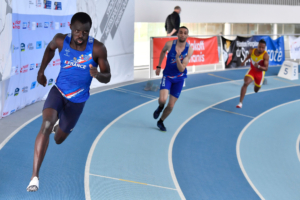
Charles Antoine at the 2021 Virtus World Indoor Athletics Championship. Photo Credit: FFSA
With his sights set on the Paris 2024 Paralympic Games, Charles is determined to win the gold medal. He acknowledges the competition, particularly from Brazilian athletes, but remains confident in his abilities.
“I want to win another gold at Paris 2024. it will be quite a memory because it’s in France and I’ll be known by all Parisians, even in Saint-Denis itself, everywhere! If I become a Paralympic champion in Paris, I can meet Emmanuel Macron again.”
Looking to the future, Charles is considering a career that combines sports with another profession, emphasizing the importance of having a balanced life.
Charles-Antoine Kouakou’s journey is a testament to resilience, hard work, and the power of a supportive community. As he prepares for the Paris 2024 Paralympic Games, his story serves as an inspiration to athletes everywhere, proving that with determination and support, anything is possible.
Join Virtus’ #MakingInvisibleVISIBLE campaign in making Charles-Antoine’s journey Visible.
WHAT IS INTELLECTUAL IMPAIRMENT?
Intellectual impairment is an umbrella term to describe a vast and neuro-diverse group of people with varying types of cognitive impairments including intellectual disability, Down syndrome and autism. Having an intellectual impairment impacts how an athlete understands the rules of the sport, interacts with other players, and adjusts to different environments. They might find it difficult to manage reaction times, remember specific race or game strategies, retain focus for long period of time, or maintaining impulse control.
Bennett’s Mission For Paris 2024: To Win Another World Title
Nicholas Bennett, a Paralympic swimmer from Canada, is gearing up to make waves at the Paris 2024 Paralympic Games. Hailing from Parksville, BC, Nicholas is not just an athlete; he’s a testament to resilience, determination, and the unwavering support of family and friends. For Nicholas, family is everything.
“I don’t know if I’ll have just one biggest supporter, I have my entire family behind me,” he shares. With a close-knit bond, Nicholas and his family share a unique connection that fuels his journey towards success.
His journey in swimming began at the age of seven, a few years after being diagnosed with autism.
“When I was three years old, I was diagnosed with my disability. My parents put me into a lot of therapy, speech therapy, and physical therapy, they even tried water therapy and they thought water therapy was the best for me because I responded quite well to it. It just kind of kicked off from there really. I joined swimming when I was 7, so just about four years after I was diagnosed with Autism and then it just started kind of cascading from there, you know, I’m here”.
Swimming became more than a sport; it became a sanctuary, providing solace and comfort in the quiet depths of the water.
“What I love the most about swimming is just being quiet underneath the water. It’s easy to clear the mind when you’re swimming. It’s the pressure of being underneath the water which I like of course, but also. I still use my blanket to cover my face while I sleep to replicate the feeling, I still do it. I find it quite comforting.”
With each stroke, Nicholas not only witnesses physical improvement but also experiences personal growth, recognizing the link between effort and progress in his training. This commitment exceeds the confines of the pool, influencing his perspective on life as a whole.
For many athletes with intellectual impairment or autism, finding coaches who truly understand their needs and training requirements can be a challenge. Nicholas is one of these athletes, but he is fortunate to have his sister filling both roles, as his sibling and coach.
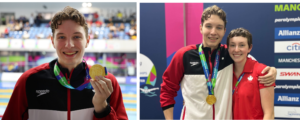
Nicholas Bennet posing with his Gold medal from Manchester 2023 (L) and with his sister Haley (R). Photo Credit: Canadian Paralympic Committee
Nicholas’s only sibling, Haley was originally a synchronized swimmer (now called artistic swimming) then switched to swimming after entering a Swim-O-Thon. Nicholas was in water therapy at age three and entered a competitive program at seven.
“We spend a lot of time together, so we don’t have to like the tip of sibling relationship. Like, we’ve never really fought a lot. I’ve been around her my entire life. Even when she went off to college, we were around each other. When I went off halfway across the country to Montreal, she came to help me settle in for the first couple of months as we’ve always just been,” Nicholas explains their unbreakable bond.
“It’s a relationship built on trust. We treat each other more as coach-athletes at the pool, but at the forefront, always siblings first,” Nicholas added.
Nicholas’s journey hasn’t been without its challenges. “As any high-level athlete, it’s just how much effort we have to put in to see any improvement,” he reflects. Yet, it’s this relentless dedication that has propelled him to success.
Nicholas registered on Virtus eligibility in early 2019 which opened doors to the international para-swimming events. He has been at his top form in the past few years, swimming out with two world titles (200m freestyle and 200m Individual medley) from Manchester 2023 and silver in 100m Breaststroke, silver in both 200m freestyle, gold in 200m Freestyle at Birmingham 2022 Commonwealth games and 200m Individual medley from Madeira 2022.
Paris 2024 will be his second Paralympic Games and looking ahead, Nicholas remains focused on his goals.
“My target for Paris is just to replicate last year’s World Championship. If we only get one medal, it’s still a success,” he declares.
Despite the competition, Nicholas remains undeterred, ready to face whatever challenges come his way.
As he prepares to make his mark in Paris 2024, Nicholas’s ultimate goal exceeds swimming.
“I want the world to be better for younger autistic people, Just keep with it. Reach out for help if you need it,” he shares a message to young athletes.
Nicholas Bennett’s journey is a testament to the power of perseverance, the importance of family, and the limitless potential of the human spirit. As he dives into the waters of Paris 2024, he carries with him the hopes and dreams of a generation, proving that with determination and support, anything is possible.
Join Virtus’ #MakingInvisibleVISIBLE campaign in making Nicholas’s journey Visible.
WHAT IS INTELLECTUAL IMPAIRMENT?
Intellectual impairment is an umbrella term to describe a vast and neuro-diverse group of people with varying types of cognitive impairments including intellectual disability, Down syndrome and autism. Having an intellectual impairment impacts how an athlete understands the rules of the sport, interacts with other players, and adjusts to different environments. They might find it difficult to manage reaction times, remember specific race or game strategies, retain focus for long period of time, or maintaining impulse control.
GG2023 Champion Chen Po-Yen Eyeing For Gold at Paris 2024
At just eighteen years old, Chen Po-Yen is poised to shine on the global stage as he prepares for his Paralympic Games debut at the Paris 2024. Unlike his peers, this exceptional teenager secured his spot in Paris last year by clinching victory in the II1 Men’s Singles event at the fiercely competitive 2023 Virtus Global Games in Vichy.
The Global Games 2023 served as the ultimate battleground for elite athletes like Yen, where skill, determination, and unwavering spirit were put to the test. Overcoming many of the ITTF’s top-ranked Class 11 opponents, Yen faced off against Makajew Maciej from Poland in the finals and secured his significant 3-0 victory (11-8, 11-8, 15-13) which secured him a place for Paris 2024.
The ITTF’s fifth-world rank holder hails from Taiwan and draws strength and support from his close-knit family, including his devoted parents and older sister, who have been unwavering in their encouragement.
Fortunately, Yen has never allowed his impairment to limit his ambitions, crediting his sister for igniting his passion for table tennis.
“I developed an interest in sports because my sister used to play table tennis during her childhood. I developed an interest as I watched my sister play from the sidelines. I love table tennis because I think the posture of playing table tennis is quite cool.”
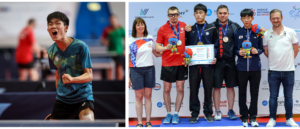
Chen Po-Yen at GG2023 after winning II1 Single’s match (L) and flaunting his ticket to Paris 2024 (R). Photo credit: T.NGUYEN
Po-Yen received his international eligibility with Virtus in May 2022, which opened doors for him at the international elite para-sports competitions. Driven by a relentless work ethic, Yen dedicates long hours to training in the gym, honing his skills under the guidance of his coach, Wei Chun-Ta. Despite facing challenges in understanding certain tactics, Yen’s determination and perseverance have been unwavering, propelling him towards excellence.
“Since Chen doesn’t have physical or visual impairments, his regular training is the same as mainstream athletes’, including immediate tactics and physical training. There are no significant differences. However, Po-Yen’s training requires a bit more repeated practice than usual athletes.” said Chen-Po’s coach, Wei Chun-Ta, who has been training him since 2019.
“Sometimes he may have some difficulties understanding certain immediate tactics, so he needs to repeatedly practice over and over again until he understands particular tactics,” he further added.
Yen acknowledges the pivotal role played by the Chinese Taipei Paralympic Committee (CTPC) and Virtus in his journey towards success.
“I wouldn’t be here today without the significant efforts of the CTPC and Virtus. While CTPC takes care of my daily needs and training, Virtus competitions provide us with an international stage, allowing us, athletes with intellectual impairment to showcase our talents.”
Dr. Mu, Ming-Chu, President of the Chinese Taipei Paralympic Committee, who was also the Head of the Delegation for Chinese Taipei at GG2023 was emotional and very excited to witness Yen’s victory at Vichy.
“I am very proud of this young boy who is just a high school student. Chen had no specialised training program to train himself but he did his best and achieved this extraordinary result. I am very happy and proud that he qualified for the Paralympic Games in Paris next year.”
Yen is looking forward to making his Paralympic debut at Paris 2024.
“I’m very happy to represent our country in Paris 2024. I will continue to work hard and bring glory to our country. For me, there are two most competitive players, one is the world’s top-ranked player from Belgium, Florian Von-Acker and one from South Korea, Kim Chang-Gi who could be my biggest rivals in Paris 2024. I’ll strive for the Paralympic Games medal for sure, and I hope I can set an example for young athletes with intellectual impairment.”
Po-Yen has already etched his name in history, becoming the inaugural male table tennis player to qualify directly from the Virtus Global Games for the Paralympic Games. Additionally, he holds the distinction of being Taiwan’s first representative ever in the Class 11 category at the Paralympic Games. Po-Yen seized a gold in men’s singles and a silver in mixed doubles at the Hangzhou Asian Para Games 2023 too.
Join Virtus’ #MakingInvisibleVISIBLE campaign in making Chen Po-Yen’s journey Visible.
Watch the highlights of the Women’s II1 finals from GG2023.
View the Paris 2024 Para Table Tennis schedule.
What is Intellectual Impairment?
Intellectual impairment is an umbrella term to describe a vast and neuro-diverse group of people with varying types of cognitive impairments including intellectual disability, Down syndrome and autism. Having an intellectual impairment impacts how an athlete understands the rules of the sport, interacts with other players, and adjusts to different environments. They might find it difficult to manage reaction times, remember specific race or game strategies, retain focus for long period of time, or maintaining impulse control.
Paralympian Jessica-Jane Applegate on winning gold and being told she doesn’t look disabled enough
Virtus Ambassador Jessica-Jane Applegate was recently spotted on the cover page of the UK’s ‘Big Issue Learning Disability Week edition, “Do You See Me?” The magazine was created in association with @mencap, by people with an intellectual impairment to help illustrate what they go through, celebrate their vital place in society, and present an edition from their perspective as they wanted it built.
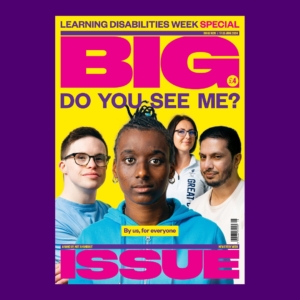
Do you see me? cover page by ‘The Big Issue’
Jessica-Jane Applegate is a swimming sensation who has captivated audiences with her remarkable achievements. At just 16, she won a gold medal for the UK, setting a Paralympic record in the 200m freestyle at the London 2012 Games. Four years later, she competed in the Rio Paralympics, earning silver and bronze medals, and in Tokyo 2021, she won gold in the relay and two bronze medals for freestyle and backstroke. Now aged 27, Jessica-Jane, who started swimming at a young age following her autism diagnosis, aims to inspire others to pursue their dreams.
Speaking in the article, Jessica-Jane said “I love winning medals because it makes me feel like all the hard training and work that I’ve put in has paid off. My favourite is gold. I love coming first,” she says, reflecting on her journey.
Jessica-Jane’s dedication to her sport is evident in her rigorous training schedule. “My training regime is really busy. I train every day except Sunday. I am in the pool once a day, sometimes twice, and I go to the gym. But I love the routine and I have been doing it for 12 years now,” she explains.
Growing up, Jessica-Jane struggled with excess energy and a lack of concentration.
“I’d tried different things, but they were more group activities and I didn’t communicate well. My mum took me to the special needs swim school, where my teachers were really understanding and I didn’t need to interact with anyone else, just swim,” she recalls.
The water has always been a place of solace for her. “I love being somewhere I can be me. It is somewhere I fit in, and I love the sound of water. It’s peaceful underwater and I feel safe away from the rest of the world,” she says.
Despite her impressive accomplishments, Jessica-Jane faces challenges due to her hidden disabilities.
“I have a learning disability with multiple health conditions, but you can’t see them. I wish the world was more inclusive for people with unseen disabilities,” she shares.
She recounts a viral TikTok video of her swimming during lockdown, where people commented, “What’s wrong with you? Broken an eyelash?” highlighting the ignorance she often encounters.
“Sponsorship is so much harder when you have a hidden disability. I’ve literally been told by brands that having a learning disability doesn’t fit their criteria at the time of the Paralympics. They want someone who looks obviously disabled so that people don’t question them or say, ‘there’s nothing ‘wrong’ with them,” she reveals. She even had a brand ask her, “Do you know anyone who looks more disabled than you who we could use for a TV advert?”
To others with learning disabilities, Jessica-Jane offers this advice: “You should not let anyone tell you that you can’t go for your dreams. They are your dreams and, as long as you enjoy it, then you should go for it.”
Many athletes with intellectual impairment go through similar issues like Jessica-Jane and Virtus Sport is on a mission to raise more awareness of intellectual impairment and elite sporting opportunities for the same group.
We want to congratulate Big Issue magazine for focussing on this important issue.
As the Paris 2024 Summer Paralympics approach, taking place from August 28 to September 8, Virtus Sport has launched #MakingInvisibleVISIBLE to celebrate athletes with intellectual impairments and autism who will be competing at the upcoming Paralympic Games- Paris 2024 across three sports Athletics, Swimming and Table Tennis. #
#MakingInvisibleVISIBLE’ will:
- Leverage the platform of the Paris 2024 Summer Paralympic Games to raise awareness about intellectual impairments and make the invisible impairment ‘VISIBLE’.
- Challenge societal stereotypes surrounding individuals/athletes with intellectual impairments and/or autism.
- Encourage people to recognize the exceptional abilities of athletes beyond their impairments.
Virtus is the brand name of the International Sports Federation for athletes with intellectual impairment and is a founding member of the International Paralympic Committee. Registered as a Charitable Incorporated Organisation in the UK (1173901)
Links

